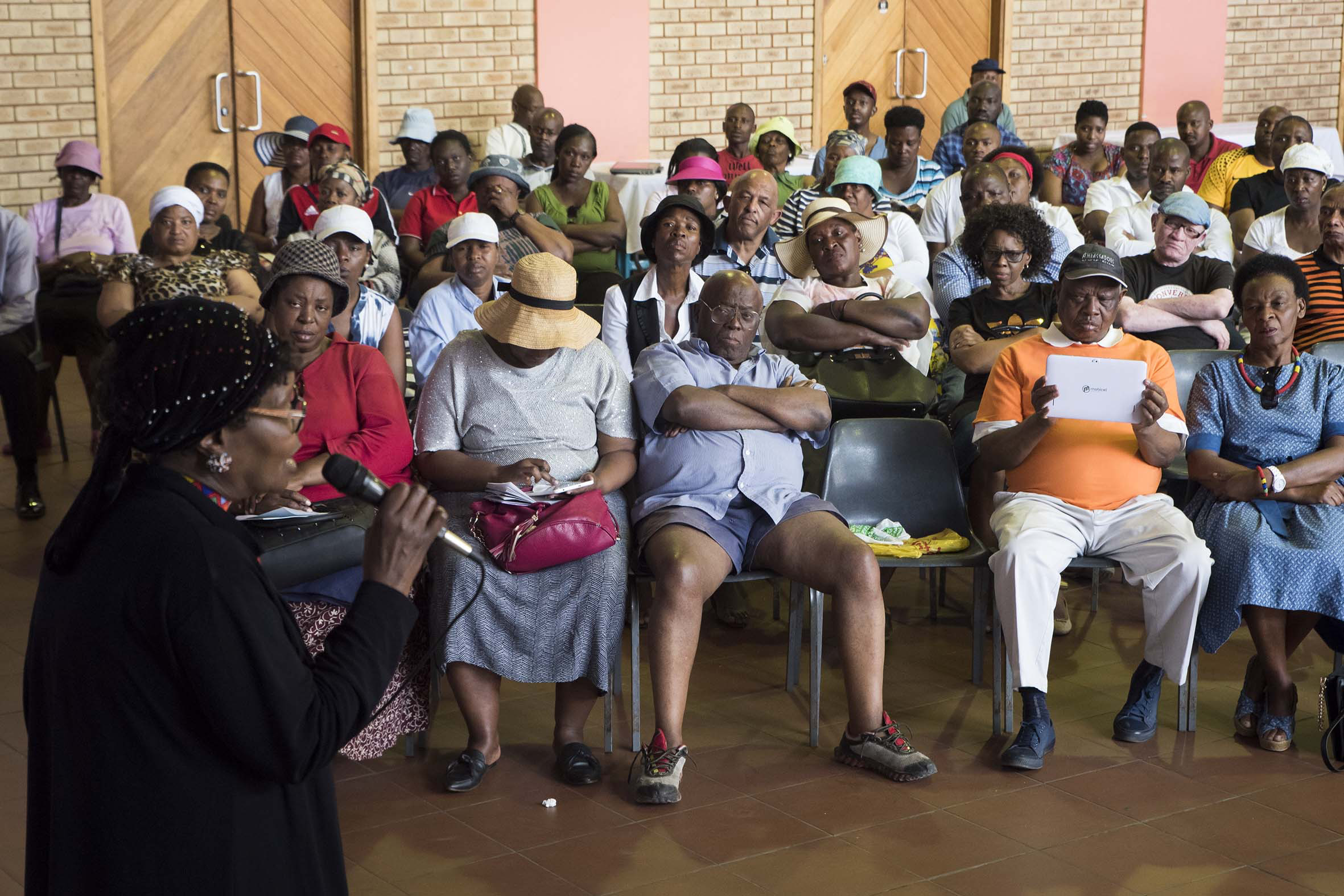Organised xenophobia gathers momentum
From small organisations in townships to party politics and Parliament, hostility to migrants and migrant-owned businesses is taking more organised forms.
Author:
28 September 2018

On a Tuesday afternoon in September, about 200 people gathered at the Diepkloof welfare centre for an “urgent imbizo” to discuss ways to “reclaim our township indigenous businesses”.
Much of the agenda seemed benign: how do we fight unemployment and poverty in the townships, while creating wealth and jobs? Before the proceedings began, a pastor, a key figure at the imbizo apologised in his opening sermon for being late because he was in a “meeting with the Lord”.
After an opening prayer, it was time for one of the organisers, Rose Nkosi, president of the South African Spaza and Tuckshop Association, to speak. Nkosi is a controversial figure with hardline views. She was clear about her stance: migrants and migrant-owned businesses were not welcome in townships.
The language of indigeneity
Despite signing a memorandum of understanding in 2015 with the Somali Community Board, and others, which seemed to indicate that her stance on migrants had softened, Nkosi has not held back her xenophobic views. She was adamant that spazas and tuckshops owned by “indigenous” South Africans would thrive if migrants were evicted from townships.
“You are trying to mess around with my businesspeople … I am telling you now what I know about them. They are struggling to make a cent, they are struggling to make R1 because they are mushroomed by these people who we don’t know how they came into South Africa,” Nkosi said to an ovation from the crowd.
Nkosi questioned how migrants could enter South Africa and start businesses in townships “at the expense of South Africans”, claiming the law did not allow migrants to own and operate businesses. “Go home, go home, go home, go home!” Nkosi chanted as some of those in attendance cheered.
She repeated the discredited allegations about fake food and expired goods that led to attacks on migrants and resulted in at least three murders in Soweto last month.
Open threats
Another organiser claimed he had told South Africans who were renting spaces to migrant shop owners that their “safety isn’t guaranteed”, and that those gathered at the imbizo had to help “clear out our backyards”. “If you allow these people to come back, your safety is not guaranteed. It is not guaranteed,” he emphasised.
As those in attendance raised their concerns and offered ideas, one man stood up and urged people not to target migrants and blame them for unemployment and a lack of opportunity. He was loudly jeered and booed.
Two days later, the organisers and some supporters marched to the Diepkloof police station to hand over a memorandum with complaints about migrants and migrant-owned spaza shops. This group was much smaller than the initial meeting.
This organised and open commitment to xenophobic ideas and demands is not an aberration. Small xenophobic organisations are springing up in various parts of the country. Their statements have repeatedly led to violence and, at times, murder.
New Frame recently wrote about the African Basic Movement and the People’s Revolutionary Movement in KwaZulu-Natal, both highly xenophobic organisations.
The African Basic Movement party has been making threats via loudspeakers on the backs of trucks and bakkies in townships. The party has close links to the Northern Region Business Association, two members of which face charges of public violence after migrant-owned stores were looted in areas in KwaZulu-Natal in August following calls for migrants to leave the area.
The Democratic Alliance
But it is not just small organisations and parties engaging in openly xenophobic politics. Johannesburg Mayor Herman Mashaba’s views on immigrants, and his repeated accusations of their links to crime, are well documented. He has frequently blamed “foreigners” and “illegal immigrants” for a host of crimes in the city and the country.
Mashaba is not an outlier in his party. At the launch of its election campaign in Newtown, Johannesburg, last weekend, the Democratic Alliance (DA) adopted an explicitly xenophobic position. One of the party’s key points in its election campaign was to “secure our borders”. This rhetoric mirrors that of many right-wing parties and politicians that have been gaining traction in the West.
The party argues that no country in the world can afford not to secure its borders, and that the DA would be able to provide the leadership to ensures a corruption-free Department of Home Affairs. On the DA’s 2019 election campaign website, it claims the department is “riddled by corruption and disorganisation, and has caused an immigration system failure, followed by violence and tragedy”.
As part of its attempts to enforce stricter border controls and police the movement of people, the party will take a hardline view on migration. It will only “assist, support and care for legitimate refugees and asylum seekers”, and allow entry only to migrants with “scarce skills” who would be able to grow the economy and create jobs. The party promises to ensure undocumented immigrants are either “regularised or assisted in leaving the country if they do not meet the criteria for remaining in the country”.
It is not just the DA that is taking an increasingly aggressive stance against migrants and immigration to South Africa.
The ANC’s head of elections Fikile Mbalula recently made similarly xenophobic statements when he told a crowd in Soweto that South Africa had become a “banana republic to foreign nationals”. He made these comments in Orlando following the violent looting of migrant-owned businesses in August.
Independent fact-checking website Africa Check also recently raised questions about the accuracy of National Police Commissioner Khehla John Sitole’s statement that “11 million people who visited this country never returned to their own countries”.
Parliament’s National Council of Provinces is deliberating the Border Management Authority Bill, while the White Paper on International Migration was approved by government last year, with the aim of creating a more “modern and strategic approach” to managing the country’s borders.
